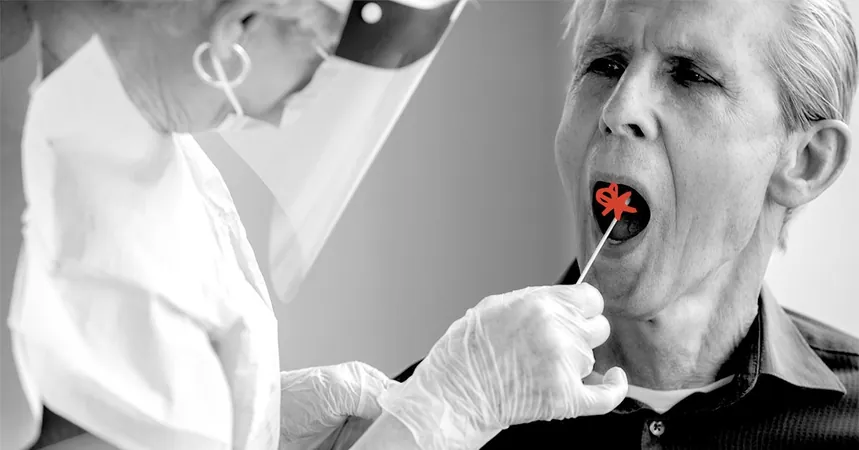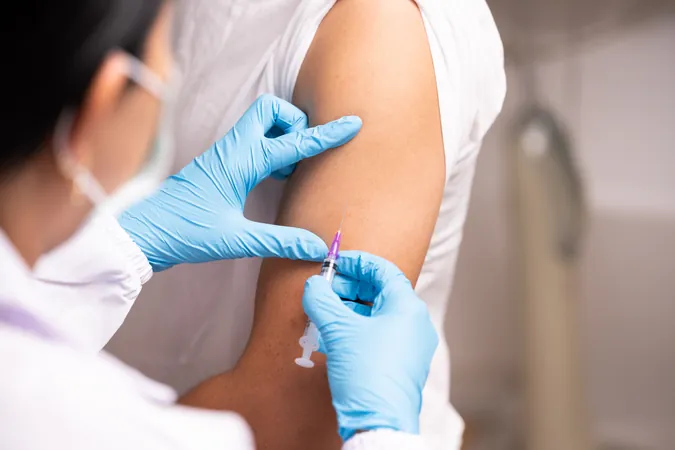
Groundbreaking Cheek Swab Test Could Revolutionize Predictions of Mortality Risk!
2024-10-08
Author: Jia
Introduction
Scientists have long acknowledged that the aging process varies immensely from person to person, influenced by a mixture of genetics and lifestyle choices. Now, an innovative tool known as CheekAge is stepping onto the stage, promising to revolutionize the way we predict mortality risk.
What is CheekAge?
CheekAge offers a quick, noninvasive method to analyze epigenetic changes in cheek cells, providing a glimpse into a person’s biological aging and mortality risk. Researchers recently reported that this tool surpasses previous models reliant on blood samples, indicating a significant breakthrough in the monitoring of biological aging.
The Aging Process
While we often think of aging as a straight path, the reality is that some individuals, like supercentenarians, age more slowly due to fortunate genetic factors. In contrast, lifestyle influences—ranging from stress and poor sleep to unhealthy dietary habits, smoking, and excessive alcohol consumption—can rapidly accelerate aging. These lifestyle choices imprint themselves on our genome through epigenetic modifications, allowing scientists to assess molecular aging at specific genomic sites.
Understanding Epigenetics
Epigenetics examines how gene activity is modified without changing the underlying DNA sequence. This field studies how various factors, such as environment and personal experiences, can influence whether genes are activated or silenced.
Evolution of Epigenetic Clocks
Over the last decade, epigenetic clocks have become popular tools devised to estimate biological age through the analysis of DNA methylation patterns obtained from blood samples. However, this year brought the introduction of CheekAge, a second-generation epigenetic clock utilizing easily obtainable cheek cell data.
Research Findings
In their recent publication in Frontiers in Aging, the research team confirmed that CheekAge not only accurately predicts mortality risk but also maintains high correlation with epigenetic data from blood and other tissues. Maxim Shokhirev, PhD, the lead author of the study and Head of Computational Biology and Data Science at Tally Health in New York, elaborated, “CheekAge computes your epigenetic age using methylation marks on DNA and is significantly linked to lifestyle factors like sleep quality, exercise frequency, alcohol consumption, and health conditions such as cancer treatment and BMI.”
Cohort Study
The research examined a cohort of 1,513 individuals born between 1921 and 1936 as part of the Lothian Birth Cohorts study at the University of Edinburgh, focusing on how various factors impact cognitive aging. Participants' blood was analyzed for DNA methylation every three years, establishing a comprehensive dataset to evaluate the efficacy of CheekAge in predicting mortality.
Significance of Findings
According to the findings, for every one standard deviation increase in CheekAge, the risk for all-cause mortality soared by 21%. Such results suggest that CheekAge could serve as a valuable, noninvasive alternative for studying the biology of aging, further establishing a robust link between epigenetic changes and mortality across different tissues.
Expert Opinions
Brittany Ferri, PhD, an occupational therapist affiliated with the National Council on Aging, praised the study as "an innovative perspective on aging." She noted the potential of this method for routine health assessments, emphasizing its noninvasive nature compared to traditional blood tests.
Tailored Health Strategies
As researchers identified specific gene sites, including PDZRN4—potentially functioning as a tumor suppressor—and ALPK2, associated with cancer and heart health, they underscored the need for tailored health strategies to manage aging more effectively. “Understanding and managing the aging process early on could be pivotal in delaying or preventing age-related diseases,” Ferri commented.
Conclusion
In conclusion, while CheekAge represents an exciting leap towards personalized healthcare and equitable health practices, researchers stress that ongoing studies are necessary for validation. As of now, the test awaits approval from the Food and Drug Administration (FDA), marking a significant but challenging path ahead for this groundbreaking aging prediction tool.





 Brasil (PT)
Brasil (PT)
 Canada (EN)
Canada (EN)
 Chile (ES)
Chile (ES)
 España (ES)
España (ES)
 France (FR)
France (FR)
 Hong Kong (EN)
Hong Kong (EN)
 Italia (IT)
Italia (IT)
 日本 (JA)
日本 (JA)
 Magyarország (HU)
Magyarország (HU)
 Norge (NO)
Norge (NO)
 Polska (PL)
Polska (PL)
 Schweiz (DE)
Schweiz (DE)
 Singapore (EN)
Singapore (EN)
 Sverige (SV)
Sverige (SV)
 Suomi (FI)
Suomi (FI)
 Türkiye (TR)
Türkiye (TR)